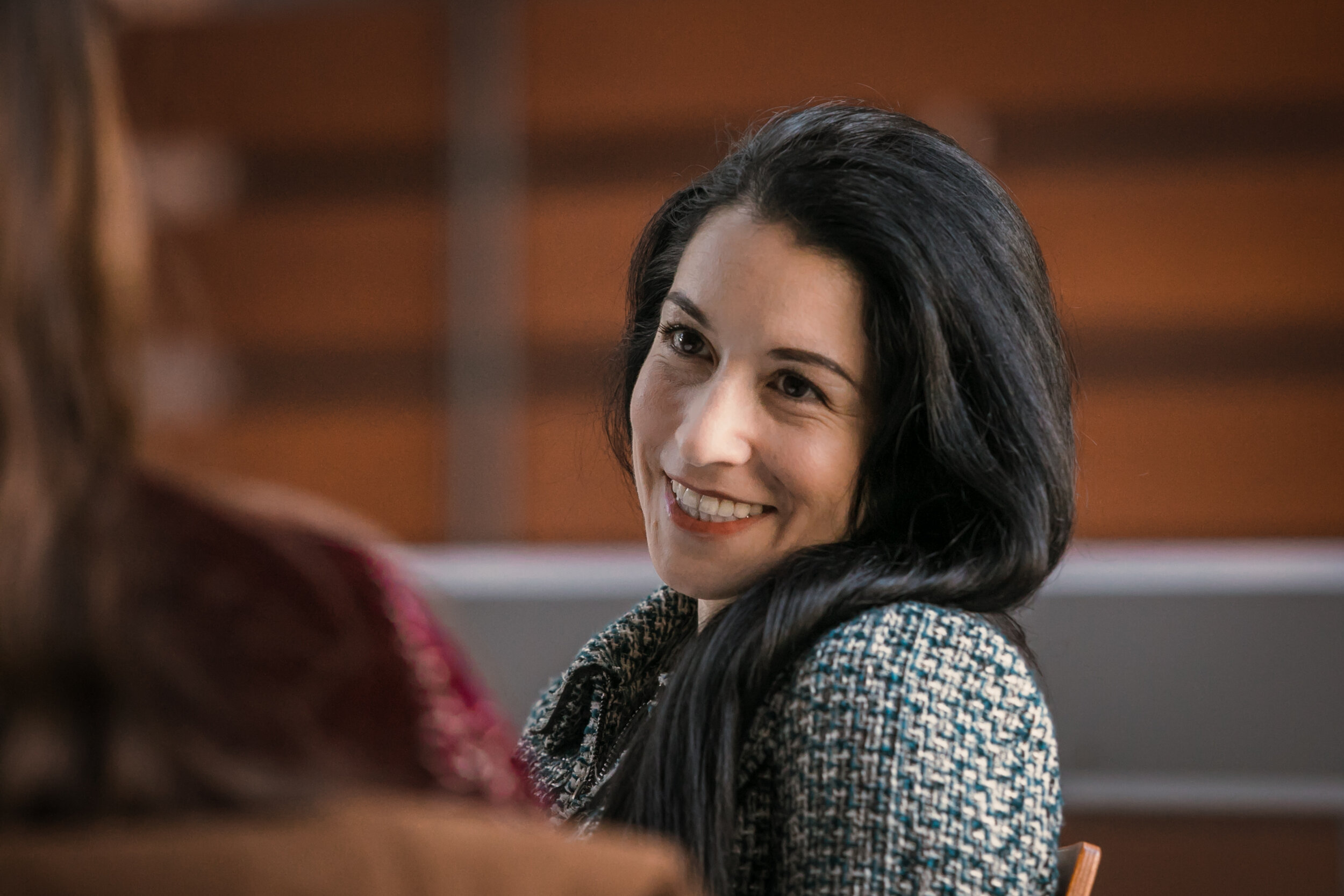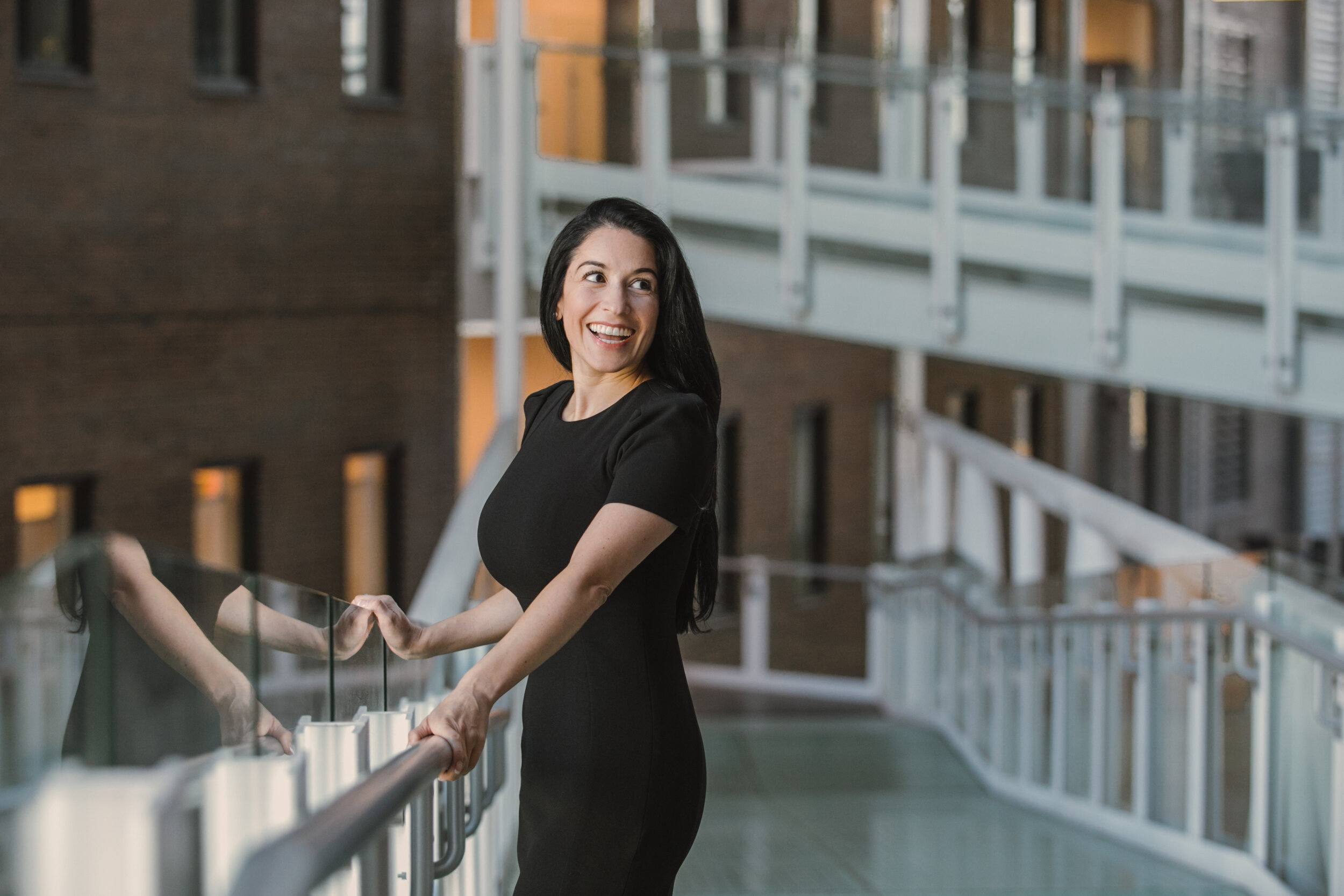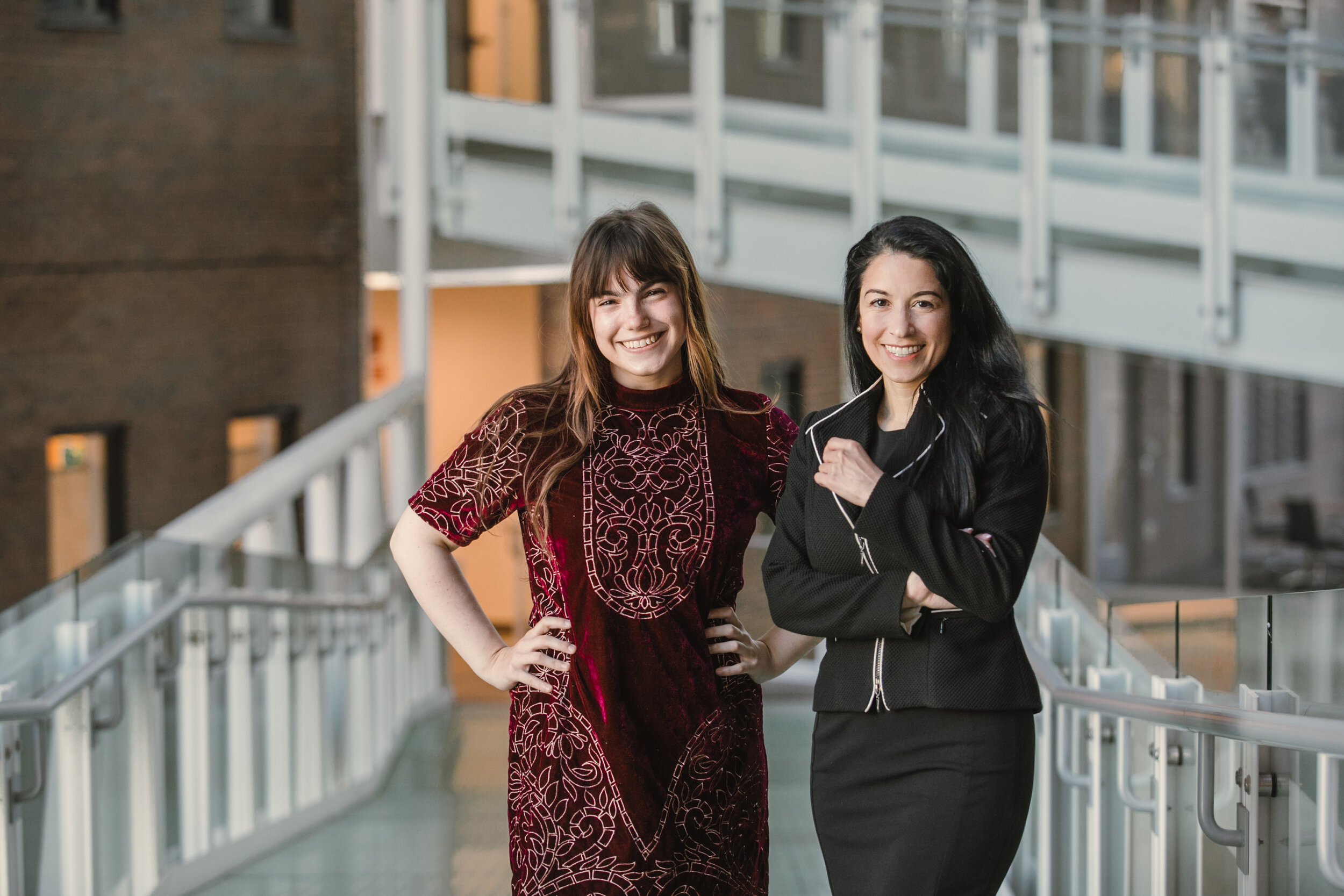The Students (and the Compassion) Behind Springdale’s Free Health Clinic
Pharmacy student Keely Morris, Megan Rich, MD, and students Hem Patel, Meghan St. John, Dhruv Kohli, Glen McClain and Maria Espinola, PsyD, in front of the Healing Center in Springdale, Ohio. Photo courtesy of Colleen Kelley/UC Creative Services.
Written by Olivia Taylor. Photography by Angie Lipscomb.
As a resident of Women of Cincy, I was charged to create a capstone project, something that would top off this experience and serve as a culmination of my work. While at Women of Cincy, one of the most surprising aspects was the emphasis on empathy. I’m always astounded by people taking the initiative for others, or wielding selflessness for the health of a community.
I’ve watched family members struggle with M.S., neurological diseases, breast cancer, and autism, and I’ve seen the hardships illness can bring. Having your health taken away, whether it be physical or mental, is devastating. The prospect of a hospital bill without insurance only adds to the burden.
The percentage of uninsured people in the United States rose from 7.9% in 2017 to 8.5% in 2018 – that’s 27.5 million people without insurance. Cincinnati is below the national average with an uninsured rate of 6.43%, which, according to estimates, is dropping. But people are still falling through the cracks when it comes to basic healthcare services.
Ohio ranks as 46 out of the 50 states when it comes to healthy behaviors, and 40 in overall health and well-being.
Springdale, Ohio is a lively city, nestled on the edge of greater Cincinnati. The skyline is lush with green trees and family homes, but with 17% of its population living below the poverty line and 12% without insurance, the city needed a helping hand. Cincinnati offers numerous free health clinics, but reaching them can be a burden for Springdale residents who live 30 minutes from downtown.
So in July 2019, a free healthcare clinic opened in Springdale led by U.C. medical students after years of fundraising, organizing, and recruiting. “[Before], you’d have to take two or three bus lines to get health care, which is not feasible for some people, and that includes finding childcare and taking time off work,” said Keely Morris, a pharmacy student at U.C. and team member at the clinic.
I’m always astounded by people taking the initiative for others, or wielding selflessness for the health of a community
–Olivia Taylor
People without insurance can now receive services from doctors, pharmacists, and other health professionals without paying out of pocket.
The clinic runs out of the Healing Center in Springdale and is open on Saturdays from 9 a.m. to noon for acute problem check-ups, blood pressure and glucose screenings, pharmaceutical services, as well as any questions patients may have. The clinic is operated by a team of volunteer medical students and faculty from U.C.
“Medical students do health histories and physicals, and pharmacy students come in and help when needed. We also have physicians volunteering their time to be our attendings and make sure everything is correct,” said Meghan St. John, a U.C. medical student and the clinic’s communications director. “That way, we make sure we're giving good quality care to people. And we're also learning in the process.”
When the clinic opened, I saw numerous news stories about the services and the people behind it. The clinic wasn’t about getting an extra gold star on their resume; instead, it speaks to that selflessness that reveals itself in humanity every so often.
St. John told me it’s not hard to find medical students and physicians to volunteer their time to help others at the clinic. What I really wanted to know is: Who are these people who have shown such determination to help others? What are their stories? How did so many people come together to create this clinic? So for my capstone project, I decided to talk to just a few of the many people who were a part of this journey. What I found is empathy put to work.
“The impact I've seen, personally, is just people having a better idea of their own health,” said Joseph Zegar, a clinic manager and U.C. pharmacy student. “[It’s] giving them the power and knowledge to be more involved in their health care.”
Dr. Maria Espinola was born in Patagonia, Argentina during the dictatorship of Jorge Rafael Videla. The dictatorship ended during her early childhood, but she grew up hearing the stories of those who survived, and it led her to start advocating for human rights as a child. “I learned about a lot of human rights violations really early on – probably too early,” she told me. “So, I became very committed to preventing something like that from happening again.”
She came to the U.S. not knowing English and with $500 in her pocket. Despite the adversity in her way, she earned her doctorate in clinical psychology and ended up at U.C. after finishing a postdoctoral fellowship at Harvard.
A month into Espinola’s tenure, student Caroline Hensley came to her with a flyer she’d created for the clinic. “[Hensley] has a level of resilience that it is very difficult to find,” Espinola said. “She faced so many barriers in the three-and-a-half years before the clinic opened, most people weren’t willing to support the project, but Caroline remained persistent, focused, and hopeful. I can’t tell you how many people said ‘No.’”
Espinola has supported the clinic as a faculty adviser, recruiting volunteers, gathering support from administrators and helping with operational issues. “Seeing the enthusiasm from the students and their commitment to serve marginalized people who would not otherwise have access to healthcare is very inspiring,” she said.
Medicine is supposed to be a connection between the physician and the patient. It's not supposed to be one-sided.
–Meghan St.John
Along with Espinola, other faculty advisers include Dr. Megan Rich and Dr. Joseph Kiesler, as well as Kelly Epplen, associate dean in the James L. Winkle College of Pharmacy.
Throughout my interviews, I was told many times that I couldn’t write about the free health clinic without talking to Caroline Hensley. She is the driver of the entire operation and an undergraduate medical student at U.C. And as the morning sunlight began to melt the overnight frost on an early November morning, Hensley sat down with me and reflected on her journey to opening the health clinic.
Her passion for healthcare stems from her childhood, watching her family go through challenges in the healthcare system. “I have a brother with Down’s syndrome, and I saw really positive healthcare interactions with our family and negative healthcare interactions, such as when people didn’t listen or weren’t patient with my brother.”
It started when Hensley worked at a federally funded health clinic in Over-the-Rhine and noticed many people without insurance were traveling from far outside of downtown Cincinnati to receive healthcare. And when she began at U.C., she knew she wanted to help break down social barriers blocking many people from receiving health care.
“I talked with some friends who are also interested in thinking about health disparities and vulnerable populations and services,” she said. “We were about to start medical school, and we started to think about the resources the university has to help make this a reality." With grants from donors and the university, the clinic was able to open in summer 2019.
“We have an amazing fundraising team,” Morris told me. “We've got donations from private donors, from the university, and we have been applying for grants, and we've gotten them a fair amount of those.”
However, before the clinic opened, Hensley said she and the team went to local organizations in the community to understand how best to serve the population: “We wanted to plug into the community and fill those gaps.”
Like Hensley, Keely Morris’s interest in healthcare started at a young age. As a child, she sat in the back of her mom’s old Chevy Tahoe, reading aloud the names of prescription medicines to help her mom study for exams. “I sat through nursing school with my mom. She's probably the reason why I got into the pharmaceutical field to begin with,” Morris said.
When Morris entered pharmacy school at U.C. she began meeting and making friends with fellow students; one of those students was Caroline Hensley. Now a fourth-year pharmacy student, Morris assisted in opening the clinic and is now the pharmacy chair of the organization.
For St. John, her career in medicine is rooted in the simple love of helping others. “I just really love people. I love to talk to them, and I love to listen to them. Medicine is supposed to be a connection between the physician and the patient. It's not supposed to be one-sided.”
Going to the doctor’s is something we occasionally have to schedule, and it’s usually a mild irritant in the cycle of our lives; still, routine exams are just one aspect of the larger picture of human health. However, social and economic factors contribute to lifestyle decisions that lead to adverse health consequences. Eating fruits and vegetables can be difficult if there isn’t a nearby affordable grocery store. Perhaps taking daily walks for exercise isn’t a possibility in an unsafe neighborhood.
The clinic sits within the Healing Center, an already established organization in Springdale that also offers a food pantry, entry-level English classes, computer classes, career coaching, and other community services. Morris said having the clinic in the Healing Center was “the perfect storm with a perfect location.”
Hensley wants the clinic to emphasize the importance of social barriers factoring into a person’s health:
The Healing Center helps with things that are really hard to address when you're in a clinic by yourself. Like what if you don't have food at home? How are you gonna take your medicine? There's this beautiful little glimmer of hope in the healthcare industry that there's starting to become this emphasis on the social determinants of health. We [the American healthcare system] do a terrible, terrible job of addressing all the things that could have prevented the heart attack. If you're white, and you have a good education and you understand how to advocate for yourself, you can figure out how to go through the healthcare system. But if you've never interacted with the healthcare system, you can really feel intimidated and don't want to speak up for yourself, and the healthcare system can be a really nasty place.
Caroline Hensley photo courtesy of Colleen Kelley/UC Creative Services.
The clinic’s team hopes to soon transition to primary care and regular check-ups in addition to its already established services, according to St. John.
The clinic offers every patient blood pressure and glucose screenings, and if the results are concerning, they help the patient find appropriate services and treatment options. “Our goal is long-term primary care,” Hensley said. “So being able to screen anyone for high blood pressure, and then being able to take care of someone who has high blood pressure, is a big step in the right direction.”
The clinic also addresses acute problems – the flu or a sprain – and, if needed, finds treatment options through the clinic’s network of professionals. “We’ll see what's been going on, and then we’ll work with our interdisciplinary team, medical students, pharmacy students to figure out how to help, whether it’s a prescription or getting another service.” Hensley said. “And for some people, it might be helping them figure out what other clinics they might be eligible to go to that might be closer to their house.”
Sitting down to write this piece, I looked back on the people I talked to, and I was overwhelmed by the genuine kindness they showed towards me and others. They speak about their numerous colleagues in such a loving and admiring light. They take empathy and materialize it into tangible assistance for others. This health clinic is compassion made visible. They don’t look down on those who are uninsured, but rather, they’re calling out the system that lets folks fall through the cracks in the first place.
“I'm one of those people who believes that healthcare is a right. Everybody has a right to healthcare,” Morris said. “Our founding fathers called it life, liberty, and the pursuit of happiness – you can't have that if you are not healthy.”





